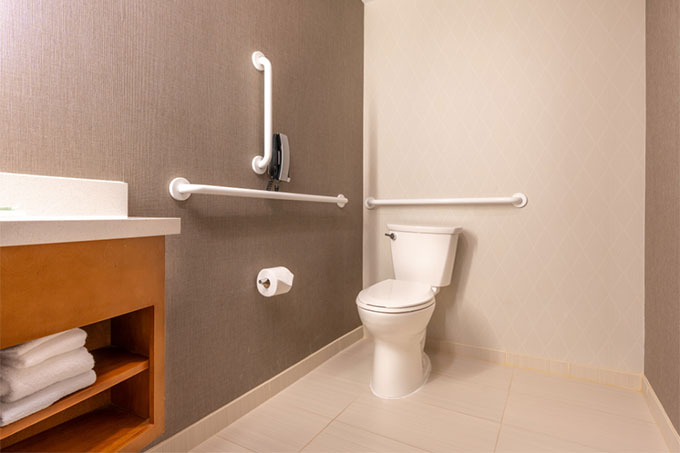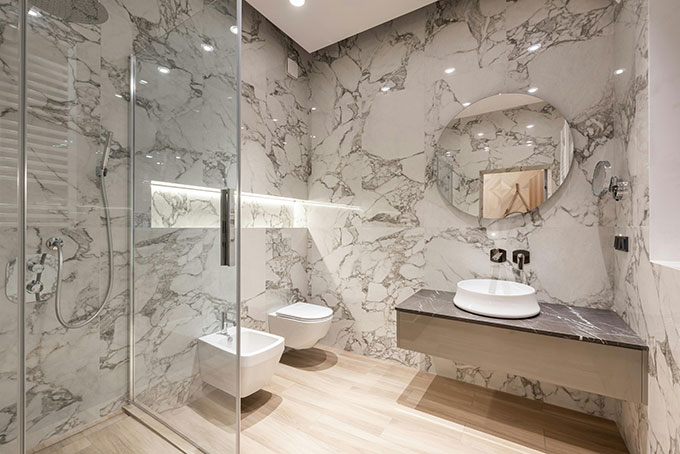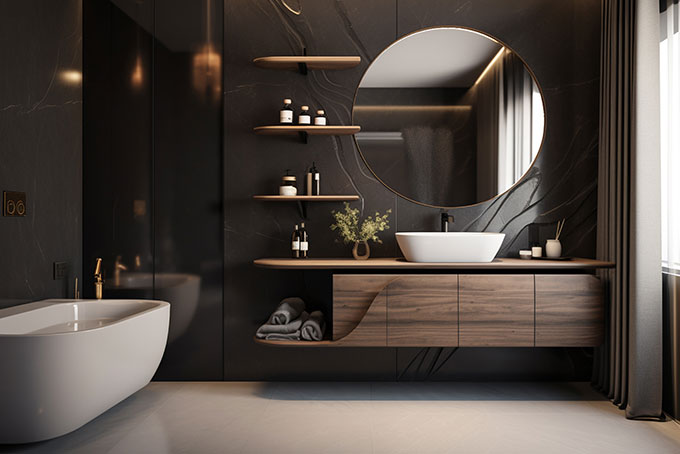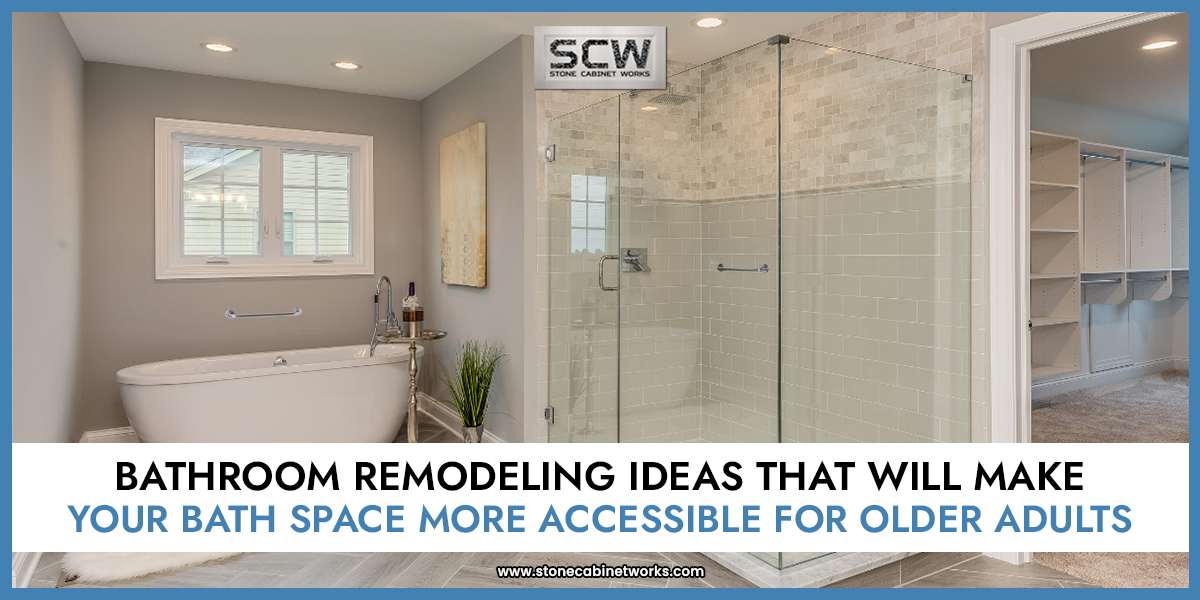Remodeling a bathroom that is accessible for an older adult is not just about ensuring safety, but it’s about independence, comfort, as well as aesthetics. As we age, our physical capabilities may change, making it crucial to adapt our living spaces accordingly. In this blog, you’ll explore a comprehensive guide to bathroom remodeling ideas that will enhance accessibility for seniors, ensuring they can navigate their personal space with ease and confidence.
Understanding the Needs of Older Adults
Before diving into specific bathroom remodeling ideas, it’s essential to understand the common challenges faced by older adults in their old bathroom:
1. Mobility Issues
Conditions such as arthritis, joint pain, or balance problems can make it difficult to move around the bathroom safely.
2. Vision Impairment
Low vision or diminished eyesight can affect depth perception and the ability to see hazardous risks.
3. Limited Strength
Over time, as your loved ones age, weakness in the arms or legs can make it challenging for the younger adult to perform daily tasks like bathing or getting on and off the toilet.
By addressing these challenges through thoughtful design, you can create a bathroom that promotes safety and independence.
Bathroom Remodeling Ideas to Make Your Bathroom Accessible
Following are some bathroom remodeling ideas that you can do to make your bath space more accessible:
1. Incorporate Safety Features in Your Bathroom

-
Grab Bars
When it comes to remodeling a bathroom for older adults, the primary goal is to create a safe and functional space that accommodates their needs. One of the most effective ways to achieve this is by installing grab bars in strategic locations.
-
Installation
The grab bars should be installed inside and outside the shower, bathtub, and next to the toilet which helps in provide essential support for individuals as they move around the space. It’s crucial to ensure that these grab bars are securely anchored into wall studs to safely support weight.
-
Design Options
Choose grab bars that blend with your bathroom decor. They come in various styles, colors, and finishes, allowing you to maintain an aesthetic appeal while ensuring functionality.
-
-
Non-Slip Flooring
Another important consideration is the flooring. Opting for non-slip materials can significantly reduce the risk of falls. A well-chosen floor can make a world of difference in terms of safety and accessibility.
-
Material Choices
Opt for textured tiles, vinyl, or rubber flooring that provides traction than other glossy smooth surface. Avoid glossy surfaces that can become slippery when wet.
-
Area Rugs
If you use bath rugs, ensure they have non-slip backing and are not loose that can be tripped over to prevent slipping.
-
-
Avoid loose Adequate Lighting
Incorporating effective lighting in your bathroom is essential for enhancing accessibility for elderly. By layering different different lighting elements, you can create a safe, functional, and inviting bathroom that meets the needs of older adults.
-
Layered Lighting
Use a combination of ambient, task, and accent lighting for layering. Bright overhead lights can illuminate the entire space, while task lighting near the mirror can help with grooming tasks.
-
Motion Sensors
Consider installing motion-sensor lights that automatically turn on when someone enters the bathroom, reducing the risk of falls in low-light conditions.
-
2. Accessibility Enhancements For Improving the Comfort of Older Adults

-
Curbless Showers
By eliminating the curb or choosing curbless shower, you create a seamless transition that allows for easy entry and exit.
-
Design Features
A curbless shower should have a gentle slope towards the drain to prevent water pooling. Use a frameless glass enclosure to create an open feel and prevent water from splashing outside the shower area.
-
Seating Options
Install a built-in bench or a fold-down shower seat for seniors to sit easily while showering. Incorporating this type of seating options provides a safe place to rest and reduces the risk of slipping.
-
-
Walk-In Tubs
Adding a walk-in tub having a handheld shower with a long hose can enhance usability, allowing adult to shower while seated comfortably.
-
Safety Features
Look for walk-in tubs with low thresholds, built-in grab bars, and anti-slip surfaces.
-
Ease of Use
Ensure that the door is easy to open and close and that the controls are intuitive and accessible.
-
3. Comfort and Convenience
-
Toilet Height Adjustments
Toilet height adjustment is also crucial to help prevent falls and enhance comfort.
-
Raised Toilets
Install a toilet that is higher than standard models, or add a toilet seat riser. This reduces the effort needed to sit down and stand up.
-
Bidet Options
Consider adding a bidet or a bidet attachment to enhance cleanliness and reduce the need for excessive reaching or bending.
-
-
Wider Doorways
-
Construction Considerations
Widening doorways to at least 36 inches allows for easier navigation with mobility aids. If possible, use pocket doors to save space and eliminate the need for door swings.
-
-
Lever Faucets
-
Installation
Replace traditional knobs with lever-style faucets that can be easily operated with a single hand. This is particularly beneficial for those with arthritis or limited grip strength.
-
Temperature Control
Install anti-scald valves to prevent burns, ensuring that water temperature remains safe.
-
-
Seating Options
-
In-Bath Seating
If space allows, include a waterproof chair or stool in the shower or near the tub. This provides a safe place to sit while bathing.
-
Vanity Seating
Consider a small, comfortable stool at the vanity for tasks like grooming. Ensure it’s easy to move in and out of the space.
-
4. Functional Layout
-
Sinks and Counters
Bathroom sink or countertop is another common site for bathroom accidents. To make your sink as well as countertop accessible, follow these guidelines:
-
Height Adjustments
Install sinks at a height that is comfortable for both standing and seated users. Wall-mounted sinks can free up floor space and make it easier for wheelchair users.
-
Accessible Storage
Use pull-out drawers or shelves that can be accessed without bending down. Store frequently used items at waist level.
-
-
Storage Solutions

-
Open Shelving
Consider open shelving for easy access to towels and toiletries. Ensure that items are organized and within reach. You can add other storage solutions that are easily accessible for elderly.
-
Cabinet Design
Use cabinets with easy-to-pull handles and soft-close features to prevent pinched fingers.
-
Additional Tips for a Senior-Friendly Bathroom
1. Color Schemes
Soft, contrasting colors can help with visibility. For example, a light-colored wall with darker fixtures can make it easier for seniors to distinguish different elements in the bathroom.
2. Textured Surfaces
Incorporate textured materials for grab bars and flooring to enhance grip and prevent slips.
3. Smart Features
Install smart lighting that can be controlled via voice commands or mobile apps. Consider smart shower systems that allow for pre-set temperatures.
4. Emergency Alerts
Consider adding a medical alert system or a panic button in the bathroom for emergencies.
5. Consult With Aging-in-Place Specialists
Work with contractors who specialize in aging-in-place renovations. They can provide valuable insights and ensure compliance with safety standards.
Conclusion
Remodeling a bathroom for older adults is an investment in safety, comfort, and independence. By implementing these detailed ideas, you can create a space that not only meets the practical needs of seniors but also enhances their quality of life. A thoughtfully designed bathroom can empower older adults to maintain their independence while ensuring they feel secure and comfortable in their own home. Embrace these changes, and you’ll create a sanctuary that caters to the unique needs of aging individuals with the expertise of remodeling experts, allowing your elders to navigate their daily routines with confidence and ease.


